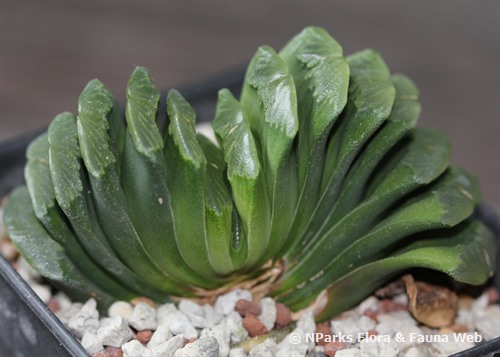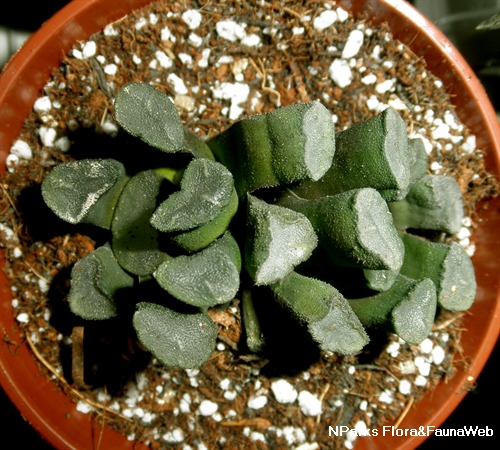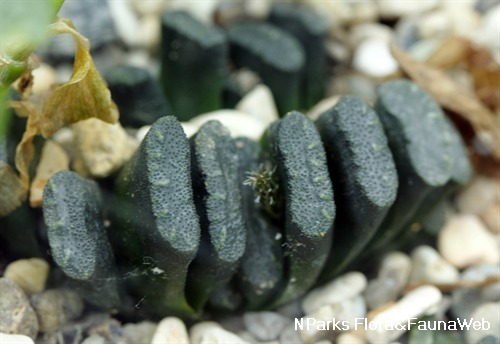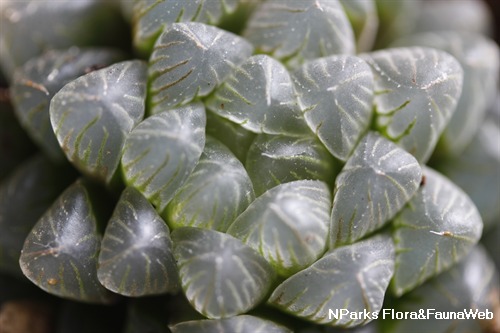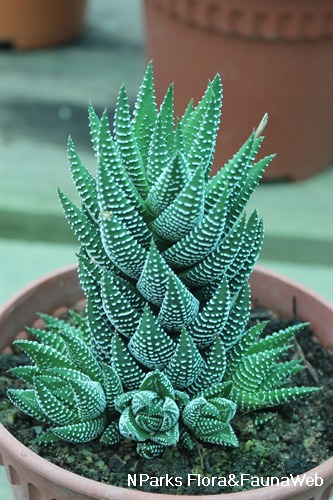
Name
Classifications and Characteristics
| Plant Division | Angiosperms (Flowering Seed Plants) |
|---|---|
| Plant Growth Form | Succulent Plant |
| Lifespan (in Singapore) | Perennial |
| Mode of Nutrition | Autotrophic |
| Plant Shape | Columnar |
Biogeography
| Native Distribution | South Africa |
|---|---|
| Native Habitat | Terrestrial |
| Local Conservation Status | Non-native (Horticultural / Cultivated Only) |
Description and Ethnobotany
| Growth Form | Succulent with a columnar growth form. |
|---|---|
| Foliage | Thick, triangular leaves are densely clustered in a spiral arrangement around the stem. They are densely covered in small, white tubercles which are mostly round, but occasionally linear. |
| Habitat | Occurs on hillsides and mountains. |
| Cultivation | This species will adopt a more compact form when well-exposed to direct sunlight. This species, like other Haworthias, are usually not attacked by pests except for the occasional mealy bug. |
Landscaping Features
| Desirable Plant Features | Ornamental Foliage, Ornamental Form |
|---|---|
| Landscape Uses | Indoor Plant, Container Planting |
Plant Care and Propagation
| Light Preference | Full Sun |
|---|---|
| Water Preference | Little Water |
| Rootzone Tolerance | Drought Tolerant, Well-Drained Soils |
| Maintenance Requirements | Low |
| Pest(s) | Sucking Insects |
| Propagation Method | Stem Cutting |
| Propagation Method Remarks | Offset |
Foliar
| Mature Foliage Colour(s) | Green, White, Patterned |
|---|---|
| Mature Foliage Texture(s) | Rough, Thick |
| Foliar Type | Simple / Unifoliate |
| Foliar Arrangement Along Stem | Spiral |
| Foliar Attachment to Stem | Sessile |
| Foliar Shape(s) | Non-Palm Foliage (Falcate / Curved) |
| Foliar Margin | Entire |
| Typical Foliar Area | Microphyll ( 2.25cm2 - 20.25 cm2 ) |
Image Repository
Others
| Master ID | 31509 |
|---|---|
| Species ID | 5906 |
| Flora Disclaimer | The information in this website has been compiled from reliable sources, such as reference works on medicinal plants. It is not a substitute for medical advice or treatment and NParks does not purport to provide any medical advice. Readers should always consult his/her physician before using or consuming a plant for medicinal purposes. |

